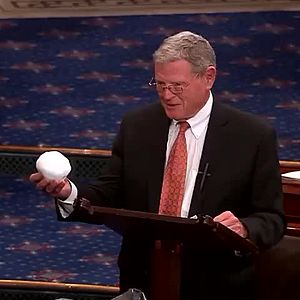
Within the sociology of knowledge, agnotology (formerly agnatology) is the study of deliberate, culturally induced ignorance or doubt, typically to sell a product, influence opinion, or win favour, particularly through the publication of inaccurate or misleading scientific data (disinformation).[5][6] More generally, the term includes the condition where more knowledge of a subject creates greater uncertainty.
Stanford University professor Robert N. Proctor cites the tobacco industry's public relations campaign to manufacture doubt about the adverse health effects of tobacco use as a prime example.[7][8] David Dunning of Cornell University warns that powerful interests exploit the internet to "propagate ignorance".[6]
Agents of culturally induced ignorance include the media, corporations, and government agencies, through secrecy and suppression of information, document destruction, and selective memory.[9] Passive causes include structural information bubbles, including those that reflect racial and class differences, based on access to information.
Agnotology also focuses on how and why diverse knowledge does not "come to be", or is ignored or delayed. For example, knowledge about plate tectonics was censored and delayed for at least a decade because some evidence remained classified military information related to undersea warfare.[7]
The availability of large amounts of knowledge may allow people to cherry-pick information (whether or not factual) that reinforces their beliefs[10] and ignore inconvenient knowledge by consuming repetitive or fact-free entertainment. Evidence conflicts on how television affects viewers.[11]
- ^ Cama, Timothy (26 February 2015). "Inhofe hurls snowball on Senate floor". The Hill. Archived from the original on 14 October 2022.
- ^ Barrett, Ted (27 February 2015). "Inhofe brings snowball on Senate floor as evidence globe is not warming". CNN. Archived from the original on 7 April 2023.
- ^ "NASA, NOAA Analyses Reveal Record-Shattering Global Warm Temperatures in 2015". NASA. 20 January 2016. Archived from the original on 29 December 2023.
- ^ Woolf, Nicky (26 February 2015). "Republican Senate environment chief uses snowball as prop in climate rant". The Guardian. Archived from the original on 21 October 2023.
- ^ Kreye, Andrian (2007). "We Will Overcome Agnotology (The Cultural Production Of Ignorance)". The Edge World Question Center 2007. Edge Foundation. p. 6. Retrieved 12 August 2007.
This is about a society's choice between listening to science and falling prey to what Stanford science historian Robert N. Proctor calls agnotology (the cultural production of ignorance)
- ^ a b Kenyon, Georgina (6 January 2016). "The man who studies the spread of ignorance". BBC Future.
- ^ a b Palmer, Barbara (4 October 2005). "Conference to explore the social construction of ignorance". Stanford News Service. Archived from the original on 24 July 2007. Retrieved 12 August 2007.
Proctor uses the term "agnotology" – a word coined from agnosis, meaning "not knowing" – to describe a new approach to looking at knowledge through the study of ignorance.
- ^ Kreye, Andrian (17 May 2010). "Polonium in Zigaretten : Müll in der Kippe (Polonium in cigarettes : Garbage in the butt)". Sueddeutsche Zeitung. Retrieved 15 July 2014.
Proctor:...Die Tabakindustrie hat ... verlangt, dass mehr geforscht wird. Das ist reine Ablenkungsforschung. Wir untersuchen in Stanford inzwischen, wie Unwissen hergestellt wird. Es ist eine Kunst – wir nennen sie Agnotologie. (Proctor:...The tobacco industry has ... called for further study. That is pure distraction research. At Stanford, we study how ignorance is manufactured. It is an art we call agnotology.)
- ^ Cite error: The named reference
2005confwas invoked but never defined (see the help page). - ^ Knobloch-Westerwick (2009). "Study: Americans choose media messages that agree with their views". Communication Research. 36. Sage: 426–448. doi:10.1177/0093650209333030. S2CID 26354296. Archived from the original on 9 July 2009. Retrieved 6 July 2009.
- ^ Thakkar RR, Garrison MM, Christakis DA (5 November 2006). "A Systematic Review for the Effects of Television Viewing by Infants and Preschoolers". Pediatrics. 118 (5): 2025–2031. doi:10.1542/peds.2006-1307. PMID 17079575. S2CID 26071118.